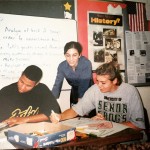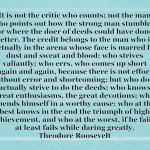(This is an edited version of my contribution to 3Ps in a Pod: An Educational Podcast, Season 7 Episode 12, Dear Me: A Letter to My Beginner Teacher Self, produced by the Arizona K12 Center.)
Hey,
Well, I said yes to this thing because it sounded pretty cool, but like everything else, it’s been easy to put off, so here I am living up to the motto that if you wait until the last minute, it only takes a minute. The thing is I promised Donnie I’d write a letter to you, that’d be me, when you, that’d be I, was a new teacher. So, here goes.
When I imagined what’d I’d say to my younger self, I remembered an interview I heard a couple of years ago with the legendary Beatle, Paul McCartney.
In his 70s, he couldn’t believe that in his 20s, with so little of his life actually lived, he put together songs like Yesterday, Let it Be, and The Long and Winding Road. Essentially, he was talking about the difference between imagining life hypothetically and experiencing it empirically.
And that’s about where I am when I reflect on how the reality of our career and life compares to the movie you created in your head about teaching as you sat through education classes 34 years ago. You actually got a lot of it right. But, like reading a book and then seeing the movie, the movie falls short more in what it leaves out than in what it includes.
Your vision only included bell to bell teaching. It lacked anything about how meaningful your relationships with colleagues and families would be, as well as how annoying it would be to navigate cumbersome and counterproductive policies. Moreover, your imagination didn’t include anything from the last third of your career after you earned your National Board Certificate, dove headlong into the teacher leader movement, and created a new and deeper meaning for yourself about what it means to be a teacher and discovering the true professional that lives in you.
Mostly, you had no clue about how as your career progressed, so would your life along with its milestones of marriage, deaths of loved ones, kids, entry and passage through middle age, divorce, entry into the senior years, career disruption, and, in a few more years, saying good-bye to the job.
I will tell you that you made some seriously good choices in who to pay attention to as you learned how to move from the hypothetical into the empirical in both career and life. So, I want you to know how a handful of books and a few verses from the bible have made all the difference.
If you had not read Stained Glass by William F. Buckley, Jr., you most likely wouldn’t have developed your foundational decision making principle of defaulting to Yes in face of doubt. Similarly, Rabbi Harold Kushner’s book, When All You Ever Wanted Isn’t Enough, taught you that old people more commonly regret the things they didn’t do instead of the things they did. Taking that to heart, you have avoided missing opportunities that now you’d be sorry about.
You did best by paying attention to and following the advice of the author of Ecclesiastes and rather than watching the sky for rain and thus avoiding planting seeds, you cast your bread up on the water and rejoiced in the gift of eating and drinking and finding satisfaction in your toil because there is nothing better than to be happy and to do good.
But, as Jim Lehrer wrote in The Special Prisoner, a lie is anytime you keep something from someone that they have a right to know. And you have a right to know this. My one regret is that you often did – and if we’re being real with each other often still do – the right thing for the wrong reason. And that would be to earn the praise of other people. Not that it’s bad to enjoy a compliment, and not that any good you’ve done is compromised, but we’ll have to live with the fact that some part of everything we’ve done has been tainted by ego.
We can, however, take comfort in the words of the grandmother in Long Distant Life, by Marita Golden, who looks back over her life and understands, “Why old people say it all the time, that they’d do it all the same, because changing one thing changes everything, and you’re only going to get so much of it right, anyway.”
En fin, you, that’d be we, have imagined a career as a teacher, lived it out along with the rest of life, and in a few years you, that’d be we, will walk away from the job for good and have only our memories. I hope we can Let it Be.
I’ll see you when I see you,
Sandy










Comments 1
Thank you for the excellent book recommendations and the real reflection on your career trajectory.